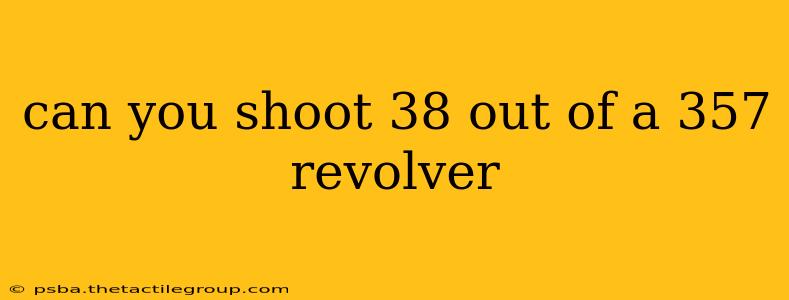Can You Shoot .38 Special Rounds in a .357 Magnum Revolver?
The short answer is yes, but with crucial caveats. You can fire .38 Special cartridges in a .357 Magnum revolver, but you should never do the reverse. Let's explore why.
Understanding the Caliber Difference
The key to understanding this lies in the cartridge dimensions. A .357 Magnum cartridge is longer and more powerful than a .38 Special cartridge. The .357 Magnum's larger case holds more gunpowder, resulting in a significantly higher muzzle velocity and more powerful recoil.
A .357 Magnum revolver's cylinder is designed to accommodate the longer .357 Magnum round. The .38 Special round will fit snugly within this cylinder, leaving some space at the rear. This space doesn't pose a safety risk when firing .38 Special ammunition; the bullet and the gunpowder will function as intended.
Safety Considerations When Using .38 Special in a .357 Magnum
While safe to fire, using .38 Special rounds in a .357 Magnum revolver presents some points to consider:
-
Reduced Performance: You're essentially underutilizing the firearm's potential. The .357 Magnum is capable of significantly more power than the .38 Special, so using .38 Special ammunition will decrease the weapon's effectiveness.
-
Potential for Misunderstanding: If someone unfamiliar with the firearm handles it, they might not realize that both .38 Special and .357 Magnum rounds can be fired. This could lead to accidental use of the more powerful round, which is especially dangerous for beginners.
-
Cylinder Gap: The extra space in the cylinder when firing .38 Special can lead to a slightly increased amount of gases escaping between the cylinder and barrel. This is typically not significant enough to be a safety concern, but it's a factor to be aware of.
Why You Should Never Shoot .357 Magnum in a .38 Special Revolver
Conversely, attempting to fire a .357 Magnum round in a .38 Special revolver is extremely dangerous and can result in serious injury or death. The longer .357 Magnum cartridge will not properly seat in the .38 Special cylinder, potentially causing a catastrophic malfunction. This can lead to:
-
Bullet deformation: The bullet can become lodged in the cylinder or barrel, leading to a jammed weapon.
-
Chamber rupture: The extra pressure from the .357 Magnum cartridge might exceed the chamber's capacity, causing it to burst.
-
Revolver damage: The excessive pressure can irreparably damage the revolver, rendering it unusable.
Conclusion: Know Your Revolver and Ammunition
It's vital to always double-check the caliber markings on both your revolver and your ammunition before firing. Using the correct ammunition is paramount for safety and functionality. While firing .38 Special in a .357 Magnum is generally safe, it's crucial to be aware of the implications and to prioritize responsible gun handling practices. The potential risks associated with mixing cartridges far outweigh any benefits.

